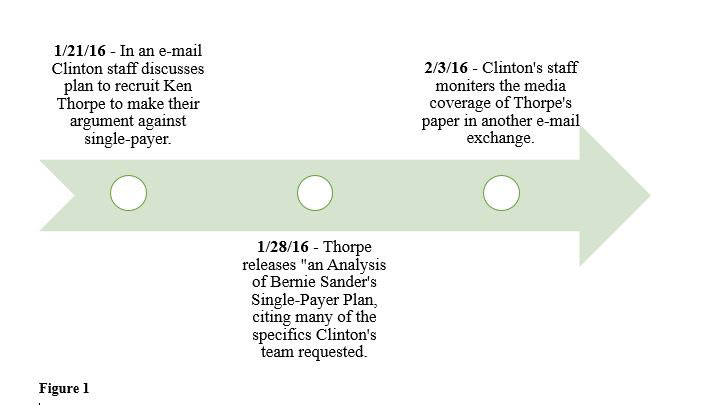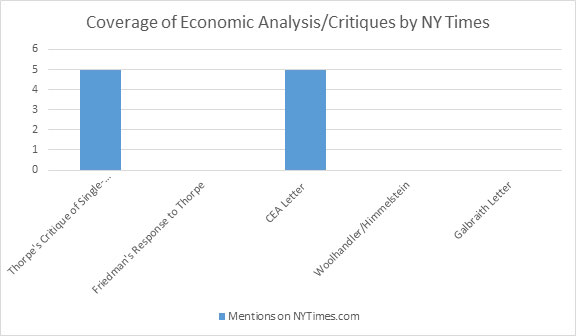
Part of the Series
Beyond the Sound Bites: Election 2016
Support justice-driven, accurate and transparent news — make a quick donation to Truthout today!
Twenty years from now, if Americans are still fighting for a single-payer health care system, opponents will still be citing Ken Thorpe’s published critique of Bernie Sanders’ Medicare for All plan from 2016. That is how damaging the analysis was to Sanders’ presidential candidacy and to the single-payer movement, according to several health reform advocates.
Thorpe, a health policy professor at Emory, has devoted much of his career to touting the economic benefits of single-payer on the federal and state levels. But in 2016, in the thick of the Democratic primary, he suddenly took the opposite stance. In his January 27 analysis, Thorpe argued that Sanders’ Medicare for All plan was too expensive and would hurt poor people, young workers and the elderly.
The paper was amplified by a barrage of favorable media coverage, almost all of it emphasizing Thorpe’s pro-single-payer credentials. “Thorpe isn’t some right-wing critic skeptical of all single-payer plans,” wrote Vox’s Dylan Matthews. Clinton’s camp, and the dominant media, manufactured an illusion of consensus among left-leaning economists.
Advocates familiar with Thorpe’s past work were perplexed as to why he undermined his own past research. Now, nine months after the publication, we may have an answer. Leaked emails from Clinton campaign staffers, published by WikiLeaks, suggest Thorpe may have been acting not as an independent analyst but rather as a political mercenary in collaboration with the Clinton campaign. In doing so, Thorpe has created a document that not only hurt Sanders’ candidacy but could hurt prospects for a truly universal health care system in the future. This is even more disappointing now that we know the Clinton campaign would lose the general election to Donald Trump; Thorpe was not just a mercenary but one on an ultimately failed, counterproductive mission.
In an email dated January 19, 2016, members of the Clinton campaign, along with some outside advisors, were discussing the effectiveness of attacking Sanders on single-payer. Jake Sullivan, a policy advisor for Clinton, wrote: “The idea would be to get someone (Ken Thorpe?) to join Brian Fallon to make the following points … [it hurts many] poor people on Medicaid right now … working seniors … [and] many young people under 26.”
Just eight days later, Thorpe published “An Analysis of Senator Sanders Single Payer Plan,” which, in addition to attacking Sanders on cost, included the three primary points of emphasis the Clinton camp had suggested: the plan’s impact on “working young adults,” (or “people under 26,” to use the Clinton camp’s language), “Medicaid households” (poor people on Medicaid right now) and “Medicare beneficiaries” (seniors). A few days after that, according to another leaked email dated February 3, 2016, which included the line, “here is a round-up thus far”), the staff were monitoring responses to Thorpe’s paper in the media. The timeline of the emails in relation to Thorpe’s piece is illuminating:

Truthout reached out to Thorpe and the Clinton campaign to invite them to address the content of the leaked emails, but neither responded.
“We are disappointed that Ken [Thorpe] failed to disclose his relationship to the Clinton campaign,” said doctors David Himmelstein and Steffie Woolhandler, in an email to Truthout. “We understand that politics is a combat sport, and expect behavior of this kind from politicians. But scholars should be held to a higher standard.”
Himmelstein and Woolhandler, professors of health policy and management at the City University of New York School of Public Health and lecturers in medicine at Harvard Medical School, were two of the few voices in the wilderness to scrutinize Thorpe’s paper. Thorpe’s analysis rests on “several incorrect, and occasionally outlandish, assumptions,” they wrote in The Huffington Post. “Moreover, it is at odds with analyses of the costs of single-payer programs that he produced in the past writing a response for arguing.”
A Truthout analysis of media coverage of this debate in February, however, showed that the media ignored Woolhandler’s paper or any other paper that reflected positively on Sanders’ plan. The New York Times cited Thorpe’s article five times in the week following its release, while Woolhandler and Himmelstein’s response was not mentioned at all.

The Vindication of Gerald Friedman
Woolhandler and Himmelstein weren’t alone in having not been given a voice in the dominant media. University of Massachusetts Economics Professor Gerald Friedman, who offered his own independent analysis of Sanders’ plans — which had far more favorable conclusions about its impact — became the subject of attacks and ridicule by liberal economists and the dominant media.
Citing Thorpe’s paper, four former chairs of the Council of Economic Advisers (CEA), wrote a letter to Friedman and Sanders, saying Friedman’s projections were “fantastical claims,” and “undermine the credibility of the progressive agenda.” This prompted another wave of articles further painting Sanders’ proposals as “voodoo economics,” as Paul Krugman described it. Friedman’s name was being dragged through the mud, and Thorpe’s work was frequently cited in these smears.
“When I saw all of this, the first thing I thought was, ‘wow I am glad I have tenure,'” said Friedman in an interview with Truthout. “I knew Thorpe’s work was sloppy. I tried to communicate with him to help sort it out. I sent him my spreadsheets and asked for his, but he ignored me.”
The media, for the most part, ignored Friedman’s voice, too. The CEA letter was cited on five occasions in the Times, while Friedman’s response to that letter was never mentioned. The Times’ news department wrote an entire article filled with so-called “left-leaning economists,” critiquing Friedman’s numbers and Sanders’ plan as “puppies and rainbows.” A letter from James Galbraith defending Friedman’s forecasting models was also ignored by the media. “I feel a little vindicated,” Friedman said, referring to all the criticism he was subjected to, in large part based on Thorpe’s work. “These revelations do not make Thorpe look good.”
One problem was that after the release of his paper, Friedman said, “no one in the media bothered to ask ‘why is Thorpe doing this study right now?'” Indeed, Thorpe’s independence was rarely, if ever, questioned in the dominant media. The same could not be said of Friedman. Krugman, for instance, suggested that Friedman was trying to earn himself a “seat at the table,” in a potential Sanders administration.
At one point Friedman told a CNN reporter during an interview that he was drinking from a Bernie Sanders mug. “They called me back to ask how I got it,” he said, noting he paid $35 for it. This scrutiny is what the media should do, of course, but the double standard is that no one bothered to see whose mug Thorpe was drinking from.
The Damage Already Done
Of course, the Clinton-Sanders race is now history. But Thorpe’s lambasting of single-payer may well have done long-term damage.
“It left an impression that the economic case for single-payer reform was weak,” said Himmelstein and Woolhandler to Truthout. “It allowed Secretary Clinton to claim that ‘the numbers don’t add up’ and risked undermining efforts for such reform not just during the campaign but in the longer term.”
Friedman agreed and compared Thorpe’s turnaround to Gov. Peter Shumlin’s abandonment of single-payer in Vermont as among the biggest setbacks for the movement in a generation. “Single-payer activists will be dealing with the aftermath of this paper for the rest of our lives,” he said.
The public, however, remains broadly supportive of a Medicare for All plan, despite these coordinated attacks. According to Gallup polling from May, 59 percent of the public and 72 percent of Democrats support “replacing the ACA with a federally-funded system.” Certainly Sanders’ impact on the national discourse has helped educate the public about single-payer.
“Fortunately, it appears that most of the public didn’t believe [Thorpe and Clinton’s] claims,” said Himmelstein and Woolhandler, “although many respected academics and pundits (e.g. Paul Krugman) swallowed them whole.”
Media that fights fascism
Truthout is funded almost entirely by readers — that’s why we can speak truth to power and cut against the mainstream narrative. But independent journalists at Truthout face mounting political repression under Trump.
We rely on your support to survive McCarthyist censorship. Please make a tax-deductible one-time or monthly donation.